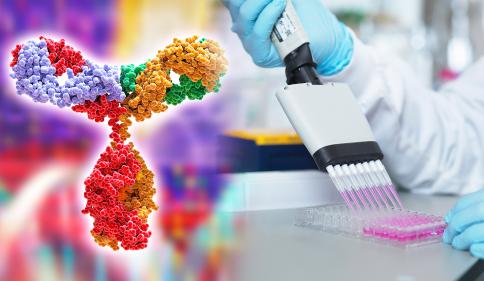Initiative to benchmark and profile monoclonal antibody and large biomolecule stability
An ORES Advanced Manufacturing Program project

Performer: National Institute of Standards and Technology (NIST)
Project leader: Michael J. Tarlov, PhD
Contract value: $973,350
Project dates: September 2022 - September 2025
Project goal: To develop and harmonize methods to standardize the description of the temperature sensitivity and stability of monoclonal antibodies (mAbs) and other large molecules used for vaccines and therapeutics.
Why it's important: When new mAbs and other large biomolecules for drugs and vaccines are developed, they often must be stored in very cold temperatures to ensure their quality and efficacy. This puts a large burden on the supply chain to maintain these freezing temperatures. Testing to reduce cold storage requirements takes time, and there is not enough information about these biomolecules to predict their temperature sensitivity. This effort will help gain some of that information to understand molecule stability at different temperatures, simplifying test design and reducing testing to more quickly reduce the burden on cold storage supply chains and help facilitate the distribution of mAbs and other biomolecules during public health emergencies.
The COVID-19 pandemic brought some important but largely hidden issues in healthcare delivery to the public view, including the challenges of biologic and vaccine stability and cold chain requirements. Maintaining vaccines and other biologics at very low temperatures (e.g., -80ºC) and ensuring that they do not experience higher temperatures for even short periods is a difficult task that increases the difficulty of transporting and distributing these important products. However, even short exposures to higher temperatures can drastically reduce effectiveness of the treatment. To avoid this, before approval, each biologic product is stored at specific temperatures for a set period of time. Then a laboratory test measures potency compared to before the product was stored.
It is relatively easy to identify conservative storage conditions such as storage in very low temperature freezers with no exposure to higher temperatures (e.g., differences of 10ºC) until they are thawed for use. However, it is difficult and time-consuming to identify acceptable variations in these protocols. What if the product was exposed to 0ºC or +20ºC for 15 minutes instead of -80ºC? In that case, will the product still work when the patient receives it? These variations can cause batches of product to be thrown out and can dramatically slow distribution where it is harder to guarantee the cold storage supply chain.
This project aims to accelerate development, harmonization, and adoption of ‘smart’ measurement methods and models for assessing mAb biologic temperature stability that will increase the confidence in the description and predictions of mAb thermal stability. These practices could dramatically shorten the time needed to develop biologic or vaccine storage and transportation protocols and they can increase confidence in the outcomes of short-term exposures to higher transport or storage temperatures.
This project was funded by the ORES Advanced Manufacturing Program.
Related links
- Memorandum of Understanding between FDA and NIST, to increase U.S. medical supply chain resilience and advance domestic manufacturing of pharmaceuticals, biopharmaceuticals, and medical devices through adoption of 21st century manufacturing technologies including smart technologies, emerging manufacturing processes, and artificial intelligence and machine learning (January 2021)
- Accelerating the Adoption of Advanced Manufacturing Technologies to Strengthen Our Public Health Infrastructure (FDA Voices, January 2021)
- NIST Monoclonal Antibody Reference Material 8671
- NIST Bioeconomy Lexicon (new, December 2022)

